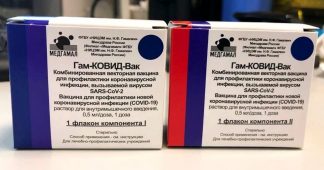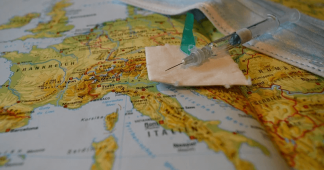By Dr Tatjana Zdanoka*
On November 3 last year, the European Parliament adopted report “On the foreign policy consequences of the COVID-19 outbreak” (https://www.europarl.europa.eu/doceo/document/A-9-2020-0204_EN.html) saying that “COVID-19 has confirmed the need for a stronger and more effective EU foreign and security policy”. Four foreign states were separately mentioned in this context: United States, China, India and Russia.
How did the majority of my fellow-parliamentarians (not myself) see the “more effective policy” towards Russia? They declare without any doubt that the European Parliament “is concerned about the effectiveness and safety of the new Russian vaccine now in use; recalls that the quality of medical products delivered by Russia in some cases was very low and hence ineffective”.
Three months later, the European Union’s foreign affairs chief Josep Borrell during a visit to Moscow said the Sputnik V vaccine developed by Russia is “good news for the whole of mankind” and expressed hopes that it will soon be used across the EU. This statement was made after the highly respected British medical journal The Lancet published research saying that “the Sputnik V vaccine appears safe and effective against COVID-19”.
I’m not so naive as to wait for the public excuses of those politicians who wrote and supported the above mentioned EP report. I simply want to use this example to show how the widely spread illness called Russophobia damages the vital interests of the European public. To my regret, the viruses of this illness come from political circles of certain former USSR republics.
In my previous publications for this portal (see https://www.defenddemocracy.press/help-latvian-journalists-defend-the-right-to-information-and-expression-stop-europes-descent-into-dystopia/ and https://www.defenddemocracy.press/the-non-citizens-of-the-baltic-states-%ce%b1-european-scandal-nobody-speaks-about/) the case of my own country, Latvia, where the campaigns of harassment against Russian-speaking minority activists has turned to a large scale, was discussed.
Here I would like to present readers with one recent publication showing that the very same illness is deeply rooted in another part of Europe, in Georgia – the South-Caucasus country associated with the EU.
The study entitled “The hostility to Russia – democratic institutions against democracy in Georgia” is published in German here: https://diskriminierung-in-georgien.blogspot.com/2020/12/die-russlandfeindlichkeit-demokratische.html. The author is Dr.phil. Gulbaat Rzchiladse, a Georgian political analyst.
The main findings presented by the author are the following.
Gulbaat Rzchiladse acknowledges that “the image of Russia in Georgia has deteriorated against the background of the hostilities in South Ossetia in August 2008. The then political leadership of Georgia has accused Russia of aggression and occupation. This statement remains officially in force to this day”.
Nevertheless, the author insists that “in the meantime it has become clear that the Georgian people are not absolutely united behind the official position of their own government on Russia. Various surveys show that a significant number of Georgians do not describe Russia as an enemy and also plead for a political dialogue with their larger neighbours. In the Georgian population there was no xenophobic attitude towards the Russians, Russian citizens; not even during the war in August 2008 and immediately afterwards, especially later. This is evidenced, among other things, by numerous Russian tourists whose number from year to year between 2013 (the year when Mikheil Saakashvili’s radical government was replaced by the new, relatively moderate government) and 2020 (the “Corona” year) impressively increases. The Georgian government, on the other hand, is forced to take into account the fact that Georgia is economically heavily dependent on Russia. In addition, hundreds of thousands of Georgians live in Russia, are employed there and enjoy the full scope of rights… The official leadership of the Georgian state and the political elite as a whole are therefore not interested in stirring up anti-Russian sentiments… However, there are many serious problems in this regard. The political situation creates dangerous tendencies in Georgia that are incompatible with a modern democratic system”.
The author of the study gives “some (of the many) facts that testify to a systematically anchored hostility towards Russia”. He describes them as follows:
- Insults to the Russians as a nation (public statements by TV program host Dimitri Oboladze on the Georgian private broadcaster “Rustavi2” are mentioned as an example).
- Ranting about the Russian nation in the media is not forbidden, but using the Russian language on TV is a criminal offense (the state Committee on communications does not react to uncensored, inflammatory and inhumane statements on TV, but makes use of the Russian language a criminal offense. For example, the authority imposed a fine of 5 thousand Lari on the TV and radio station “Obieqtivi” for allowing the station to broadcast a prime-time political talk show in Russian).
- Favouring organizations that stir up Russophobia (in Georgia, various legal entities – non-governmental organizations – which stir up Russophobic sentiments have free reign. Leaders of violent groups, such as Alexander Elisashvili, founder of the “Civil Movement”, remain socially acceptable and are supported by the Georgian representative of the American “International Republican Institute” (IRI). Their leaders attacked and badly injured a journalist who is well known in Georgia and who they consider to be “pro-Russian”. Since then, these leaders have fled abroad, namely to Poland and Ukraine, but the Georgian government is doing nothing to have them extradited).
- Discrimination at work because of one’s own opinion (if you have your own opinion about Georgia’s foreign policy course that does not conform to the official NATO / EU accession policy, you run the real risk of losing your job. This applies almost entirely to the state sector, but also to the academic sector – state and private universities. One young political scientist, despite his adequate qualifications, had to vacate his post as a research assistant at the Djawachishvili State University in Tbilisi and to continue his doctorate in Russia because he supported Georgia joining the Eurasian Economic Union and not the EU. Another young political scientist who was doing his master’s degree in Moscow at the University of “RUDN” was later turned down as an intern at the Georgian Foreign Ministry precisely because of this fact).
- The ban on Russian-language theatre performances (in 2019, the 1st Open International Theatre Festival “Golden Clementine” took place in the Georgian city of Batumi, the capital of the autonomous republic of Adjara. Among the participants in the festival was the young actors’ musical theatre “Fantazia New” from Kiev, Ukraine. This theatre planned to offer two performances – one was in the Ukrainian language, the other – in Russian. Shortly before the arrival of the young actors from Kiev, the relevant ministry of the Adjara autonomous republic prohibited the second play from being performed – just because the play was in Russian).
- Punishment of local officials inviting participants from Russia to cultural events (in the very same year 2019, Mr Tornike Rizhwadze, the head of the Adjarian government, dismissed the Minister of Education because she had invited children from Russia to march through Batumi with their national costumes and flags, just like children from other countries – Latvia, Israel, etc., as part of international folk festival).
To conclude his publication, Gulbaat Rzchiladse addresses the following questions to the Western public: “Western institutions, which should actually support human rights regardless of world politics, transfer this reality to countries like Georgia and confuse freedom of expression with the alleged Russian soft power. This gives some political forces in the respective country (specifically – in Georgia) the opportunity to discriminate against those who think differently, and unfortunately this option is being used. How do your state and non-state institutions react to these violations and attacks? What is being done on your part to ensure that internationally recognized principles and treaties as well as internal democratic laws are observed? Or do they themselves contribute to discrimination and damage the still fragile Georgian democracy? If so, what are the causes and how can the undesirable trends be overcome?”
From my side, I would also like to raise my hand in order to pose the very same questions.
Moreover, I have an additional one: “Do you agree that today, Russophobia is playing the same role that anti-Semitism did before WWII in a significant number of European countries?”
(*) Dr Tatjana Zdanoka is a Member of the European Parliament representing the “Latvian Russian Union” political party









